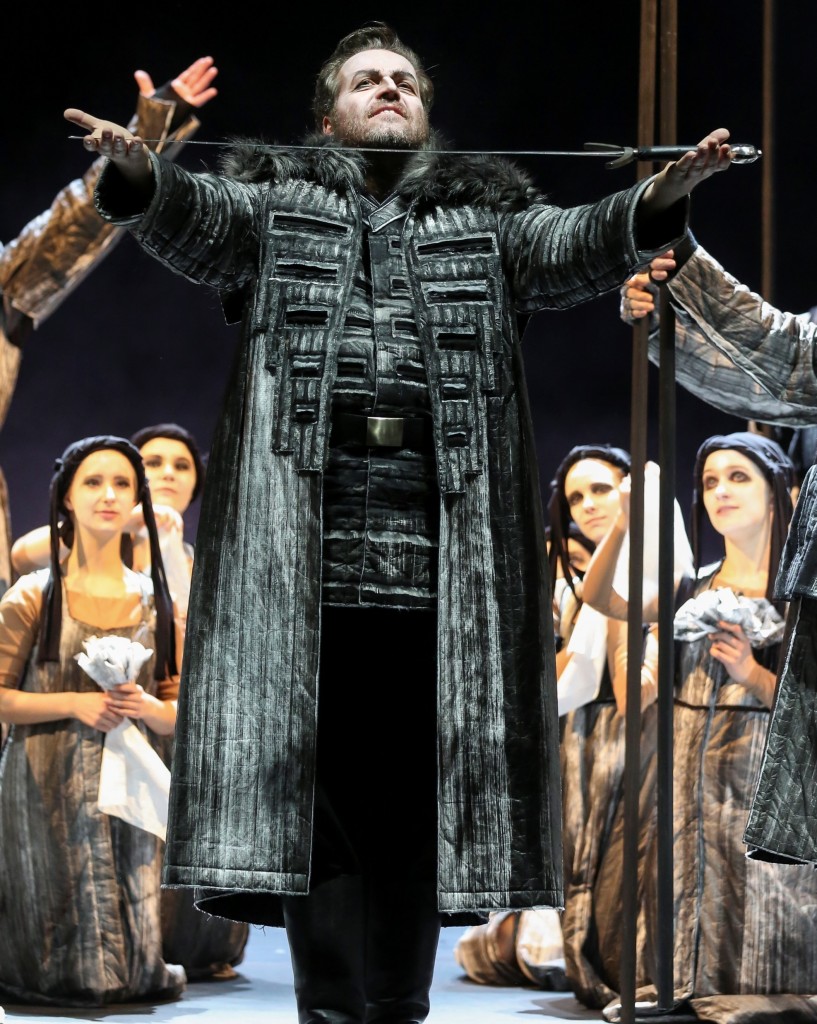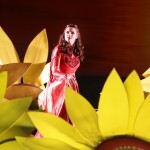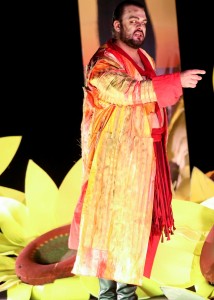 Borodin’s only opera Prince Igor – its ravishingly beautiful melodies famously used in the Hollywood musical Kismet– is now seldom heard, except for the Polovtsian dances. Yet its epic choral scenes and distinctive characters made Price Igor ‘the most important national opera since Mussorgsky’s Boris Godunov.’
Borodin’s only opera Prince Igor – its ravishingly beautiful melodies famously used in the Hollywood musical Kismet– is now seldom heard, except for the Polovtsian dances. Yet its epic choral scenes and distinctive characters made Price Igor ‘the most important national opera since Mussorgsky’s Boris Godunov.’
Borodin aimed to compose a National opera, like Rimsky-Korsakov and Mussorgsky’s, based on Russian legends, in which Russia and the Orient would meet. Two musical styles are opposed, the classic Russian, against the beguiling Oriental – emphasised by Rimsky-Korsakov (Sheherezade), who assisted in the work. The styles are quite different, the Russian defined in the opening Prologue’s celebratory anthems.
Vienna Volksoper’s staging (sung in German) picks up on these differences, with a black and silver thematic for the Russians. With silver mirrors either side, the Choir (tremendous singing from Volksoper Choir) are dressed like crusaders, in silver mesh, holding up white crucifixes. They sing songs of rejoicing, fighting for homeland and faith.
Igor is an idealist who must prove himself in battle, in spite of bad omens, and his wife Juroslavna’s pleading (soprano Melba Ramos). Sebastian Holecek , a refined bass-baritone, physically imposing, warrior-like in an elaborate silver coat, looks the part. War is the prince’s duty he sings. Prince Galitsky (bass-baritone Martin Winkler) is entrusted to look after his sister, the Queen; Igor misguidedly lays his trust in him – Winkler, fearsome, bald-headed, powerfully enacted, imposingly sung.
Contrasted against the sober monochrome of the Russian believers, the Polovtsian camp is brilliant Technicolor. Act 1 opens to nymph-like figures in crimson, waving huge sunflowers- Vienna State Ballet dancers are utterly enchanting- symbolising the exotic orientalism , the dangerous lure of the east. Behind the dancers, the stage is ablaze with giant sunflowers, triffidly creepy, in director Thomas Schulte-Michels’ stage design.
 In sumptuous red and gold gown, Konchakovna (Annely Peebo) the Khan’s daughter, in her aria, summons her man to her. Peebo’s mezzo is solid, attractively sung. Responding to her, Vladimir, Igor’s son – father and son now imprisoned- in a beautiful, internationally famous aria, sings, where is she, he’d give everything… Predictable lyrics, but Vincent Schirrmacher’s is a quality tenor, and with his oriental good looks, meltingly convincing, as he holds her shawl. Her father (the scheming Khan) would be glad to welcome him, but what would his father say?
In sumptuous red and gold gown, Konchakovna (Annely Peebo) the Khan’s daughter, in her aria, summons her man to her. Peebo’s mezzo is solid, attractively sung. Responding to her, Vladimir, Igor’s son – father and son now imprisoned- in a beautiful, internationally famous aria, sings, where is she, he’d give everything… Predictable lyrics, but Vincent Schirrmacher’s is a quality tenor, and with his oriental good looks, meltingly convincing, as he holds her shawl. Her father (the scheming Khan) would be glad to welcome him, but what would his father say?
Igor, of course, is in despair, blaming himself, he alone, for the defeat. In his aria, he sings of the freedom he’s lost; defeated, a prisoner, he’s failed his people; but he’ll come back to triumph and restore his honour. Holecek is an impressive bass-baritone, but perhaps, singing amongst these giant sunflowers, disadvantaged. In this surreal landscape, singing of how to rescue his country, he lacks some authority. But the audience was enthusiastic.
The point, presumably, of the exotic set is to emphasise the temptation, and accordingly Igor’s courage, in refusing to submit. (He refuses a Polovtsian’s help to escape; flight is unworthy of a King, he sings.) Whereas his son is enticed. Igor’s adversary Konchak at first tries to console him, that all’s for the best, that he isn’t a prisoner. Igor, could be Konchak’s ally, if he wanted ; together they would conquer the world.
Konchak (Sorin Coliban) in the Khan’s aria sings of what he can offer Igor. He’s cruel, sometimes resorts to any means, he admits. Coliban, a super-powered bass-borrowed from Vienna State Opera- suitably bearded, every inch the potentate, is absolutely the part, the standout role in the production. But even he appears a little absurd, seated in the middle of a giant sunflower. He offers Igor eternal friendship, the most beautiful women- (as long as he doesn’t threaten his land.) But Igor stubbornly resists. Hence the great feast in his honour: the singing, the Polovtsian dances.
On come the Polovtsian dancers- that gorgeous ‘Stranger in Paradise’ tune- an invocation of homeland, the dreams of youth. They have him trapped, Igor seated in amongst a harem, surrounded by man-eating sunflowers. The male dancers in purple do backwards somersaults; elaborate gymnastic contortions; breath-taking acrobatics from the women in cerise. Unbelievable! Headstands, twirling like break-dancers, on a tablet. These Vienna State ballet dancers are pulling out all the stops to impress us, and the captive Igor to give in to temptation. (But some people are never satisfied. This woman in front of me was actually checking her I-phone!) The balcony boxes next to the stage are now filled with exotically-dressed Polovtsian dancers, flashing electronic candles.
The second half (Act 3and 4) is a darker affair depicting the suffering of Igor’s people, tyrannised by Galitsky. The chorus of Russian soldiers, in vests and braces, is spectacularly choreographed. Are you happy, dear Prince, they mock their absent ruler; Galitsky, Winkler bare-chested, wearing a paper gold crown and red cloak, stirs up their revolt. Young women file in, one of them laid out centre-stage, in a mock rape scene. The bald Galitsky appears to mount her…
Cut to Igor’s wife, who in her aria pines, so long as he’s away she waits; where are the days of carefree happiness. Exceptionally sung by Melba Ramos, to oboe accompaniment, it reminded of Verdi.
A chorus of girls sing how some were seized and abused. Who is guilty? Who is the man? They’re afraid to say. But the truth must out: Galitsky does what he wants since Igor’s away. Protect us women! Princess Jaroslavna demands an explanation. Galitsky boasts, he’ll do what he pleases. Exciting tension between Melbos and Winkler! ‘The day of reckoning is not far off. Watch out!’ she warns him.-‘Igor is long forgotten’. If only she knew, he taunts her: ‘You’re too young, your husband is far away.’ Winkler’s Galitsky is sung with malice and a mocking laugh. She is too weak, and too tired to fight. Again Melba is tremendous in the part.
Troops sing of a curse broken out; the enemy is too strong. Now, brilliantly coloured, a line of Polovtsian soldiers punch the sky in triumph; more of them surge forward. The Khan is submerged in the midst of his concubines- we see their heads sticking out, encapsulated in a monster-sized flower shape. He’s standing knee-deep in women! Coliban swaggers, embodying the archetypal ‘oriental’ potentate. Igor tries to escape, but is recaptured. But Vladimir, persuaded to stay, the Khan spares his life. Ever cunning, Konchak offers his daughter in marriage, to guarantee Igor’s non-combat. (You’re my stepson from now on! To war and booty!)
Finally, we see Igor’s wife lamenting her man so far away; she invokes the great (river) Dnieper that controls Man’s fate. (A distant chorus is heard ; the Khan’s troops have released Prince Igor.) Igor and his wife re-united. In their duet, she’s incredulous; they’ve come to each other as if in a dream.
Skula and Yeroska, the clowns and turncoats of the piece, immediately change sides and call the people together to sing Igor’s praises. They rejoice in Igor, their saviour from Galitsky’s reign of terror. The opera closes assymetrically, as it began, with the Chorus, ‘We are the people!’
Surely Borodin’s opera, albeit completed by Glazunov, is a flawed masterpiece, inexplicably neglected. Vienna Volksoper’s production does it justice musically, for which Volsoper Orchestra under the distinguished Alfred Eschwe may also take credit. The cast was sterling, almost the measure of a Staatsoper roll call, without the big names, (except Coliban.) The Volksoper Chorus excelled, and Vienna State Ballet dancers are world class. What lets down this splendid revival is the (oriental) set. Those monster flowers are kitsch- ridiculous and vulgar; they detract from an otherwise distinguished production.
P.R. 22.3.2016
Photos: Sebastian Holecek (Prince Igor); Martina Mikelic (Jaroslavna), Sorin Coliban (Konchak)
(c) Barbara Palffy/ Volksoper Wien
